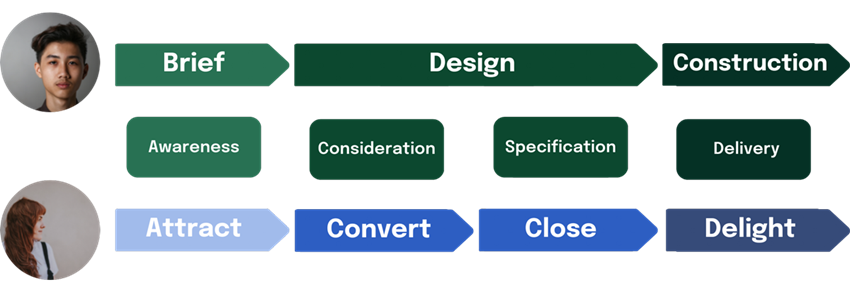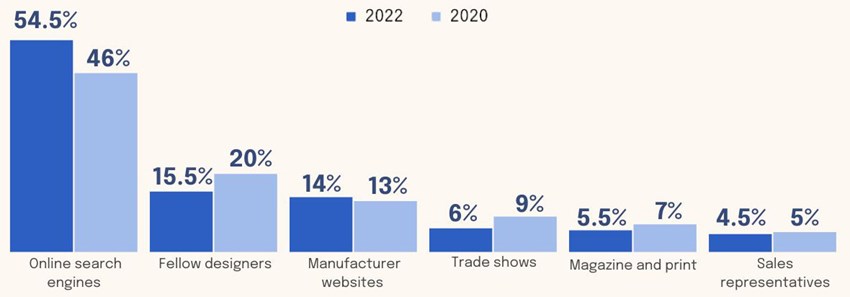This blog article is an extended excerpt from our e-book: Manufacturing the marketing mix.
Why is it important to market building products?
You might be asking this question if you’re a marketer new to the manufacturing industry. Maybe it’s the other way around: you’ve worked in the industry for years and have now found yourself in a marketing position. Or, you might just want a quick little refresher. Either way…
Marketing matters to manufacturers the same way as any other industry: you want to promote products and/or services to an audience.
Who should you target?
Selling your products to more architects, engineers, designers, and contractors (AECOs) is no easy task. As we’ve written in a recent post about why every manufacturer needs a digital strategy, marketing building products is akin to B2B – with a specification process thrown into the mix.

Regardless of the complexity, you need to remember that architects, engineers, and interior designers are people. Not robots. Sure, their decisions are heavily influenced by the many stakeholders involved in building projects as well as their firm’s and client’s aspirations. But just like any other person – they’re guided by logic and emotions. In taking a multi-pronged approach, you will help to build your brand, acquire more customers and introduce new products into the market. This being said: let’s dive into the how.
Why you need to build an online brand
Goodwill and word of mouth will take you a few steps down the road, but it’ll take long until you reach your target destination. Marketers in manufacturing need to set up a solid strategy with multiple touch points on a plethora of online and offline channels.
Trade shows have been an industry staple since the dawn of time. With that being said: digital tools are changing our behaviors and habits. Within our industry, the adoption (and mandating!) of building information modeling may be one of the biggest digital catalysts yet. So, can we see signs that digitalization is changing the rules of the game? Our 2022 survey sure indicates it:

Get more stats in Manufacturing the digital marketing mix >
Messaging, content & distribution
Standing out from your competitors by forming a messaging strategy that differentiates your products from the competition will be crucial to develop a competitive advantage. Your messaging strategy must focus on the way they think, the way they behave and the solution that your product offers that solves their problem. Whether they’re architects or designers, build a deep persona for each of these customers and tailor your messaging to suit each of them.
Another important factor is content designed to gain awareness, educate and delight your target audience. Food for thought: 62% of respondents in a 2021 survey by Demand Gen Report said that they rely on content to research and make B2B purchasing decisions. Tip: Add lovely images to inspire designers, highlight your benefits and data to support decisions, and add instruction videos on how to install and maintain your products.
Third, you need to think about distribution. For that, we’ll turn to the digital marketing poem.
The digital marketing POEM
We’re not talking about Neruda, Yeats, or Plath. Although a lot of marketers, admittedly, appreciate the prolific poets – we’re about to address the POEM marketing model: Paid, Owned, and Earned Media.

What is paid media?
Paid media is when you pay money to reach audiences. Examples of paid media include pay-per-click, native advertising, and display ads.
Pros: Paid media enables manufacturers of building products to increase awareness and engagement within a new or existing audience. It offers wide(r) reach, instant visibility, and precise targeting. You can also scale it, measure it and control messaging, spend, and targeting.
Cons: Paid media comes with a high learning curve and sensitivity to algorithms. If mishandled, costs can spiral out of control and eat up a large chunk of marketing budgets.
What is owned media?
Owned media are platforms that you control and own; a space reserved for your brand. Examples of owned media include websites, apps, and social media accounts.
Pros: Owned media won’t dig a deep hole in your pocket as the cost of writing a blog or posting an update on social media often is near to none. It also offers a high degree of control as the information and messaging are easy to edit and update.
Cons: Owned media doesn’t deliver instantaneous results. Reach relies on outside factors such as Youtube, LinkedIn, or search engine algorithms. It’s also labor-intensive and time-consuming.
What is earned media?
Earned media is outside attention that a brand receives for “free”. Examples of earned media include interviews, reviews, promotion from PR, and shares on social media.
Pros: Earned media tends to feel more trustworthy as it conveys another person’s opinion – not the brand’s. It's also a way to piggyback on others’ credibility and can boost your visibility and awareness significantly.
Cons: Earned media is significantly less predictable and controllable than owned and paid. Activities can be picked up immediately, tomorrow, or not at all. Can also result in negative attention that’s hard to backpedal and repair.
Psst… Did you know that BIMobject is the most-reviewed and highest-scoring BIM object software on G2.com? Or that USP research found that bimobject.com is the architect’s choice for manufacturer-specific BIM objects? Now you do!

Mix digital media to reach, engage and influence specifiers
Paid, earned, or owned media: which part of the POEM speaks to you? Well, the best answer here should be all. Although each type of media and outreach comes with its own set of pros and cons, they shine in symbiosis.
For instance:
Paid advertising can boost the probability that your e-books or product pages pop up in the social media feeds of the right architects, engineers, or contractors.
Search engine optimization (SEO) of your website content can earn you a spot in results pages and drive relevant, organic traffic to your site. As an added bonus: good scores on keywords decrease the cost of search engine marketing (SEM).
You can also post reviews on LinkedIn and sponsor the post if it takes off. Or add it to your website on one – or many – pages to build credibility*.
You get the point. When you manage to perfect your POEM, the results can be rather poetic.
*Full disclosure: we just did it (albeit lightly) with the G2.com and USP psst psst above.
Why you should make BIM a part of your marketing strategy
Listen… We don’t want to make your life harder by slapping an extra letter on the digital marketing POEM. But the thing is: building information modeling (BIM) is gaining ground. So are the numbers of Governments either mandating or looking to mandate BIM. It’s a factor, and you can’t leave it out of the equation if you want to get specified now – or in the future.
In why specifiers use BIM, numerous architects, engineers, and interior designers state that BIM made their lives easier and faster. Some even said that they won’t collaborate with manufacturers who can’t give them what they need.

Right now, you might be thinking: what does this have to do with me and my goals? Well, an architect can’t create a design without BIM content. And it goes vice versa: a manufacturer can’t get into BIM projects without providing them.
On that same note, a BIM content download is more than “just” a download. Specifiers save and share them with other people in the team – creating a loop of influence and marketing throughout project teams.
Get more on the value of a BIM content download >
How to market BIM content
But where do you start? First, you need to create BIM content: information-rich digital replicas of your products. Then, you need to integrate them into your marketing mix.
Ok, so. BIM matters. So does BIM content. But do you get them into your target audience’s heads and hands? You can use a mix of paid, owned, and earned. Or go the easiest, most efficient route: converge your converged media with a marketplace for BIM content that enables you to reach millions of specifiers, understand what they like, and influence them through email campaigns and awareness-boosting search ads.


Sarah Chase
Global Content Marketer












